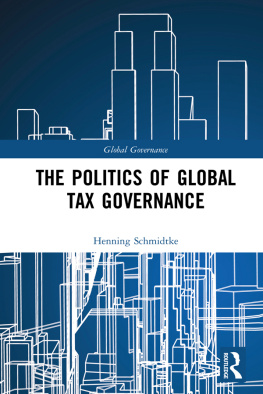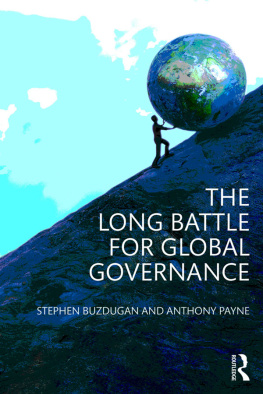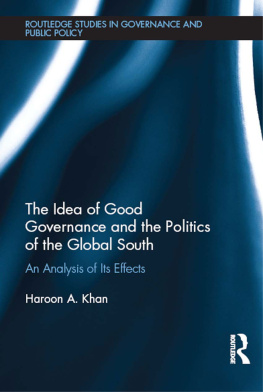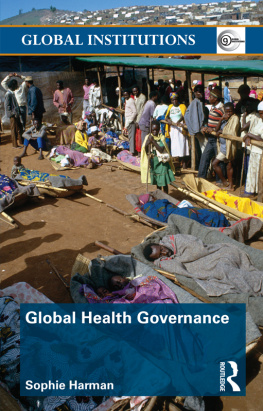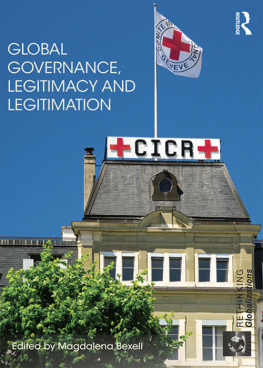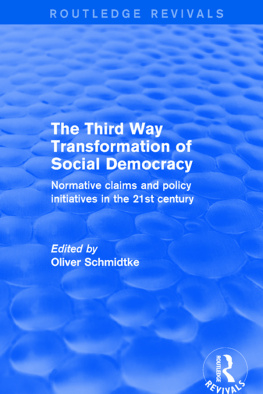The Politics of Global Tax Governance
Why has global tax governance been politicized and how can we explain the varying intensity and content of public debates? This book offers an integrated theory of the politicization of international institutions and a detailed account of how the institutional design and policy output of tax governance by the EU and OECD have developed over time.
Offering the first in-depth empirical analysis to compare politicization across international institutions, it blends institutionalist explanations that focus on the growing authority of international institutions, and sociological and political economy approaches that take into account domestic context.
Exploring why and how international institutions have become increasingly contested in the 21st century, this book will be of particular interest to the scholars of the transfer of authority from the nation-state to international institutions, and the societal repercussions and political struggles that connect these processes. Researchers in the fields of political science, international relations, sociology, and political communication will also find it useful and insightful.
Henning Schmidtke is a Research Fellow at the German Institute of Global and Area Studies (GIGA), Hamburg. His research interests include the formation, design, and behavior of international organizations and the contentious politics around them. His work has appeared in the Review of International Organizations, Review of International Studies, and West European Politics.
Global Governance
Series Editor: John J. Kirton
University of Toronto, Canada
Global governance is growing rapidly to meet the compounding challenges of a globalized 21st-century world. Many issues once dealt with largely at the local, national or regional level are now going global, in the economic, social and political-security domains. In response, new and renewed intergovernmental institutions are arising and adapting, multilevel governance is expanding, and sub-national actors are playing a greater role, and create complex combinations and private-partnerships to this end.
This series focuses on the new dynamics of global governance in the 21st century by:
- Addressing the changes in the structure, operation and impact of individual intergovernmental institutions, above all their innovative responses to the growing global challenges they confront.
- Exploring how they affect, are affected by and relate to non-state actors of global relevance and reach.
- Examining the processes of cooperation, competition and convergence among international institutions and the many global governance gaps where global challenges such as terrorism, transnational crime and energy do not confront powerful international institutions devoted to their control.
- Dealing with how global institutions govern the links among key issues such as climate change and health.
In all cases, it focuses on the central questions of how global governance institutions and processes generate the effective, legitimate, accountable results required to govern todays interconnected, complex, uncertain and crisis-ridden world.
The G20
Evolution, Interrelationships, Documentation
2nd edition
Peter I. Hajnal
The Politics of Global Tax Governance
Henning Schmidtke
For more information about this series, please visit: https://www.routledge.com/Global-Governance/book-series/ASHSER1420
First published 2019
by Routledge
2 Park Square, Milton Park, Abingdon, Oxon OX14 4RN
and by Routledge
52 Vanderbilt Avenue, New York, NY 10017
Routledge is an imprint of the Taylor & Francis Group, an informa business
2019 Henning Schmidtke
The right of Henning Schmidtke to be identified as author of this work has been asserted by him in accordance with sections 77 and 78 of the Copyright, Designs and Patents Act 1988.
All rights reserved. No part of this book may be reprinted or reproduced or utilised in any form or by any electronic, mechanical, or other means, now known or hereafter invented, including photocopying and recording, or in any information storage or retrieval system, without permission in writing from the publishers.
Trademark notice: Product or corporate names may be trademarks or registered trademarks, and are used only for identification and explanation without intent to infringe.
British Library Cataloguing-in-Publication Data
A catalogue record for this book is available from the British Library
Library of Congress Cataloging-in-Publication Data
Names: Schmidtke, Henning, author.
Title: The politics of global tax governance / Henning Schmidtke.
Description: Abingdon, Oxon ; New York, NY : Routledge, 2019. | Series:
Global governance | Includes bibliographical references and index.
Identifiers: LCCN 2018054221 | ISBN 9781138540842 (hardback)
Subjects: LCSH: TaxationInternational cooperation. | TaxationPolitical
aspects. | International finance. | International relations.
Classification: LCC HJ2305 .S36 2019 | DDC 336.2dc23
LC record available at https://lccn.loc.gov/2018054221
ISBN: 978-1-138-54084-2 (hbk)
ISBN: 978-1-351-01243-0 (ebk)
Typeset in Times New Roman
by Apex CoVantage, LLC
For my parents
Many people contributed to this book. My family and friends made it possible in the first place by encouraging my curiosity and being patient with the time-consuming process of discussing these questions. My parents have provided unwavering support since I began being a student of political science. My friends have been remarkably tolerant of my fascination with international institutions and their politicization.
Colleagues at several institutions enriched this project. Early on, the intellectual dynamism of the University of Bremen and the Jacobs University especially colleagues from the Collaborative Research Center 597 Transformations of the State helped me with many aspects to my work. My mentors Philipp Genschel, Frank Nullmeier, and Michael Zrn were incredibly generous with their time and insightful feedback. Across departments, faculty and students have supported my work. I am especially grateful to Jennifer Gronau, Achim Kemmerling, Peter Mayer, Martin Nonhoff, Steffen Schneider, Laura Seelkopf, Daniel Seikel, Sebastian Streb, Irina Wiegand, and Dieter Wolf.
I am also grateful for the support of the University of St. Gallen and the TUM (Technical University Munich) School of Governance. Extensive comments from people such as Eugnia da Conceicao-Heldt, Pieter de Wilde, Klaus Dingwerth, Matthias Ecker-Erhardt, Dominic Hoeglinger, Liesbet Hooghe, Achim Hurrelmann, Swen Hutter, Anna Leupold, Gary Marks, Christian Rauh, and Arndt Wonka immensely improved the manuscript during this time.
Last but certainly not least, people affiliated with Routledge have worked hard to bring this book to a wide audience. I am especially grateful to editor Rob Sorsby and to editorial assistant Claire Maloney for their faith in this project and their patience with my pace of work.
Henning Schmidtke
Bremen, September 2018
Exploring the causes and consequences of international institutions politicization
Global governance has undergone a fundamental transformation in the past few decades. While international institutions were long the exclusive preserve of a small circle of elites, the past 2030 years have witnessed the disappearance of the traditional separation between the high politics of international affairs and low domestic politics, giving citizens, civil society organizations (CSOs), business associations, multinational corporations, and social movements a more prominent role. Increasingly, non-governmental actors, especially from the Global North, engage with the institutional design, decision-making, and policy output of global governance arrangements.

